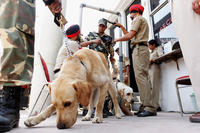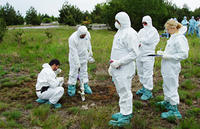-
Training mission showcases Israeli counterterrorism techniques
A group of U.S. law enforcement officials recently concluded a weeklong training seminar on the methods Israel uses to prevent and respond to terrorism
-
-
Highly-trained Indian K-9s join counterterror forces

The Indo-Tibetan Border Police (ITBP) has a highly-trained unit in its force unlike any other in the world; police handlers have taught six Labradors to carry explosives in their teeth, sneak into terrorist lairs, plant remote-controlled bombs, hide secret cameras, interpret body language, and understand English and Hindi
-
-
Cyberterrorism - The weapon of choice a decade after 9/11
Scott Schober, the president and CEO of Berkeley Varitronics Systems, warns of the growing threat from cyberterrorists; he writes that in ten years, “the terrorists’ weapon of choice may not necessarily be a 187,000 pound 767 jet loaded with fuel targeting” New York’s skyline, instead it will be pajama-clad hackers taking down an electrical grid, causing mass confusion in the aviation system, or targeting a nuclear power plant’s SCADA control system to create mass panic and chaos for millions
-
-
Push for military tribunals for terrorists
Republican lawmakers in Congress are pushing to include a provision in the 2012 military authorization bill which would require that terrorists who are not U.S. citizens who are caught plotting against the United States, would be in military custody and face military tribunals, even if they are caught in the United States. The Obama administration opposes such a requirement.
-
-
Anwar al-Awlaki and the 9/11 plotters
Representative Peter king (R-New York) wrote to Lt. Gen. Ronald Burgess, director of the Defense Intelligence Agency (DIA), to inquire whether 9/11-related detainees being held by the United States are been interrogated about the possible role U.S.-born cleric Anwar al-Awalki, who was killed by a U.S. drone on 30 September, played in the 9/11 attacks.
-
-
U.S. expands drone war to Horn of Africa
Representative Peter king (R-New York) wrote to Lt. Gen. Ronald Burgess, director of the Defense Intelligence Agency (DIA), to inquire whether 9/11-related detainees being held by the United States are been interrogated about the possible role U.S.-born cleric Anwar al-Awalki, who was killed by a U.S. drone on 30 September, played in the 9/11 attacks.
-
-
Lawmakers seek to protect NY’s growing nanotech industry from terrorists
Last week during a Senate Judiciary Committee hearing, Senator Charles Schumer (D – New York) strongly urged DHS Secretary Janet Napolitano to secure New York’s growing nanotechnology industry against a Mexican terrorist group that has attacked nanotechnology firms around the world
-
-
Terrorism in Africa: Kenyan troops invade Somalia
On Wednesday, Kenya sent its troops some 100 miles inside Somalia to take the battle to the Islamic Al Shabaab organization, killing some 75 militants; yesterday, AU troops stormed a stronghold of Al Shabaab militant group on the outskirts of Mogadishu, while a militia backed by Kenyan troops simultaneously attacked another Shabaab stronghold along the Kenya-Somalia border, taking it over and forcing Shabab fighters to flee; Somalia’s nominal government relies on Ethiopian and Kenyan troops to fight Islamic terrorists in Somalia
-
-
FBI training elite deep-diving counterterrorism unit
To bolster its counterterrorism capabilities, the FBI has created an elite group of special agents trained to track terrorism underwater
-
-
Israel-Hamas prisoner exchange goes through
Earlier today, the initial phase of prisoner exchange between Israel and Hamas has taken place; Gilad Shalit, the Israeli soldier kidnapped by Hamas operatives more than five years ago and held incommunicado since — even the Red Cross was not allowed to visit him — returned to Israel in exchange for 450 Palestinian prisoners held in Israeli jails; in total, 1,027 Palestinian (1,000 men and twenty-seven women) will be released in the exchange; the deal was reached after both Israel and Hamas agreed to major compromises; analysts say that one of the main reasons prompting Israel to show more flexibility was the desire to “clean the table” of troublesome and divisive issues in preparation for a possible Israeli military attack on Iran’s nuclear facilities
-
-
The Israel-Hamas prisoner exchange
If everything goes according to plan, then this coming Tuesday will see Gilad Shalit, the Israeli soldier kidnapped by Hamas operatives more than five years ago and held incommunicado since – even the Red Cross was not allowed to visit him — return to Israel in exchange for 1,027 Palestinian prisoners held in Israeli jails (1,000 men and twenty-seven women); the deal was reached after both Israel and Hamas agreed to major compromises; analysts say that one of the main reasons prompting Israel to show more flexibility was the desire to “clean the table” of troublesome and divisive issues in preparation for a possible Israeli military attack on Iran’s nuclear facilities
-
-
Little progress despite $3.4 billion spent on food safety programs

In the past decade the U.S. government has gone to great lengths to secure the nation’s food supply against terrorists, but more than $3.4 billion later it has little to show for its efforts; despite all the government spending, key food safety programs and counter-terror policies have been bogged down by a murky, convoluted bureaucratic process
-
-
Iranian airline sanctioned for ties to terrorism
On Wednesday the U.S. Treasury Department imposed sanctions on sanctioned Mahan Air, an Iranian airline, for supporting terrorism
-
-
U.S. unprepared for large-scale bio-attack, report warns

On Wednesday, the WMD Center released its latest report that found the United States is unprepared for a large-scale biological attack, despite spending more than $65 billion on biodefense over the past decade; the report warned that the threat of biological weapons is now greater than ever as a result of technological advances; a small team of individuals with training in key disciplines can produce “the type of bioweapons created by nation-states in the 1960s”
-
-
U.S.: Iranian agents tried to kill Saudi ambassador to U.S.

The U.S. attorney general Eric Holde rannounced yesterday that the U.S. government has foiled an Iranian plot to assassinate the Saudi ambassador to the United States; Iran wired $100,000 into a U.S. bank account in August as a down payment for the hit; the assassins — the Iranians thought they were members of a Mexican drug cartel — were to receive $1.5 million if the hit was successful
-
More headlines
The long view
What Does Netflix’s Drama “Adolescence” Tell Us About Incels and the Manosphere?
While Netflix’s psychological crime drama ‘Adolescence’ is a work of fiction, its themes offer insight into the very real and troubling rise of the incel and manosphere culture online.
